Dec 14, 2024 – 5th Day in Mindanao, Philippines, Songco, JTS Center
Hello. Today we are visiting Songco village, which preserves its traditional culture well, before heading to the JTS Center.
After completing his early morning practice and meditation, Sunim had an interview with the Ramon Magsaysay Foundation at the lodging from 7 AM. For an hour, he discussed the reasons for coming to Mindanao, his activities over the past 22 years, and their results.
After finishing the interview, he departed from the lodging at 8:20 AM and headed to Songco village. After traveling by bus for 1 hour and 10 minutes, he arrived at Songco village at 9:30 AM.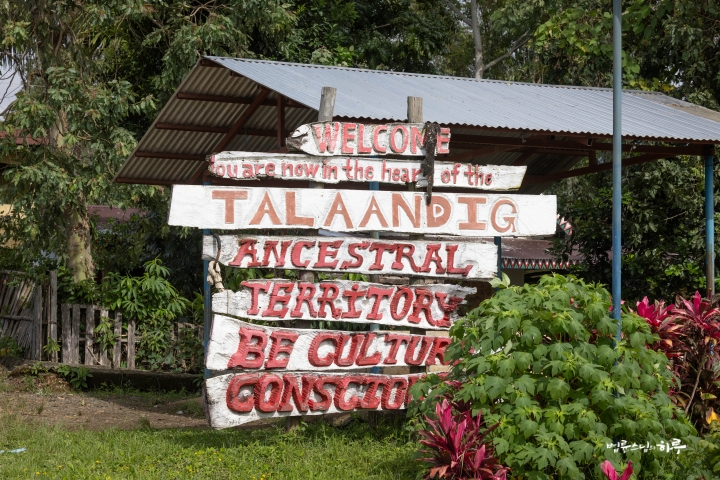
There are seven major tribes in Mindanao. The village we are visiting now is home to the Talaandig tribe. The Talaandig tribe is a people who preserve their traditional culture well. They make their own musical instruments, extract dyes from nature to paint, and have their own unique dances. That’s why Sunim invited the Talaandig tribe to Korea a few years ago to showcase their performances.
As the delegation got off the bus, the Talaandig tribe, dressed in traditional clothes, welcomed them warmly with joyful drumbeats and dances. Datu Migketay, the chieftain of the Talaandig tribe, was the first to shake hands with Sunim.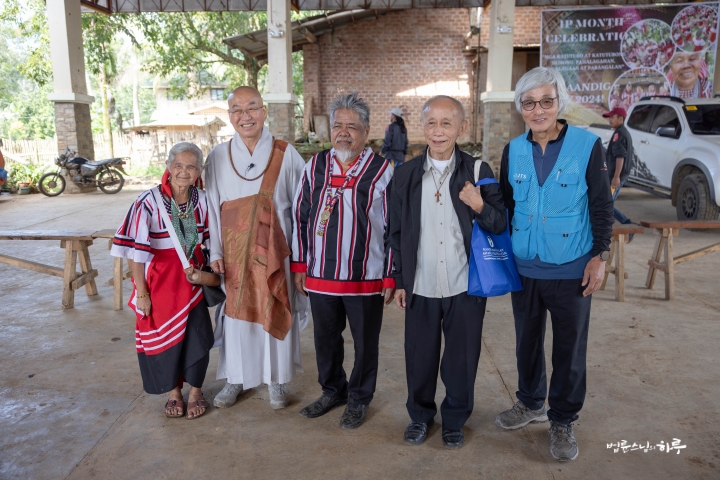
“Welcome!”
“Nice to meet you.”
Archbishop Tony from Cagayan de Oro also arrived in Songco village after a long journey. He greeted Sunim warmly.
“You still look healthy. You must be busy even after retirement.”
“Yes, I’m keeping busy.”
The Archbishop said he had something to show Sunim and unrolled a round poster. It was a poster introducing the 2002 Ramon Magsaysay Award recipients.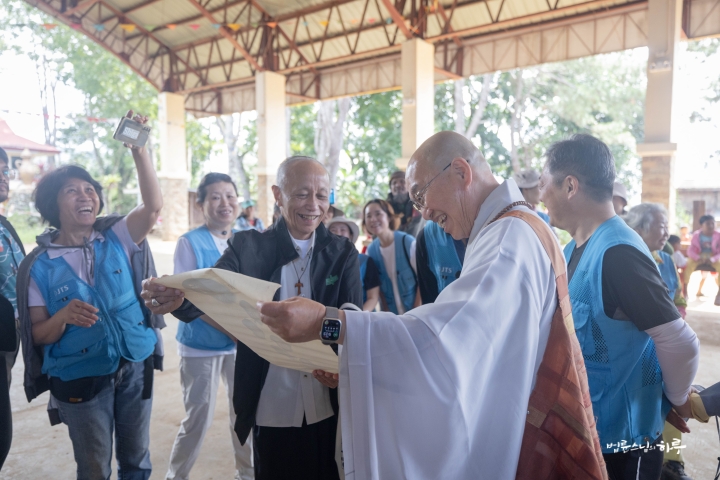
“I’d like to give this to you as a gift.”
“Thank you.”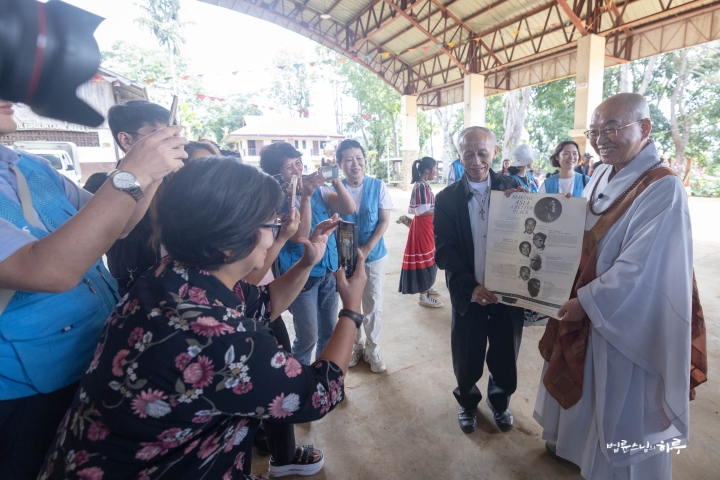
The Archbishop said he had kept the poster in his room for 22 years. As they were exchanging greetings, without any signal for the performance to begin, children naturally ran out dancing in front of the Peace Hall yard.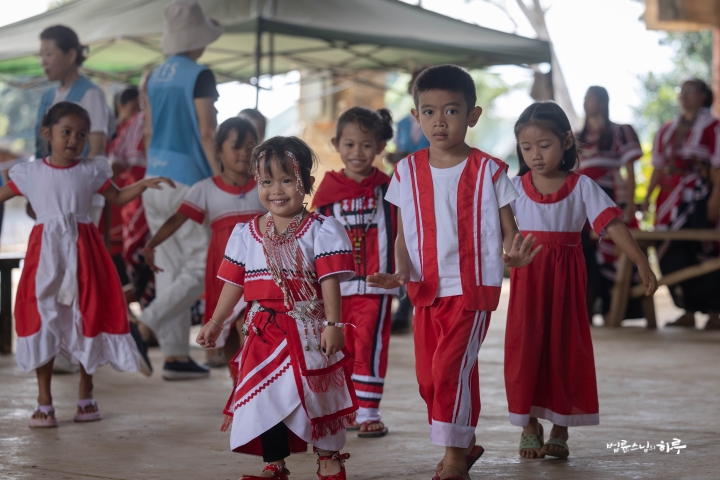
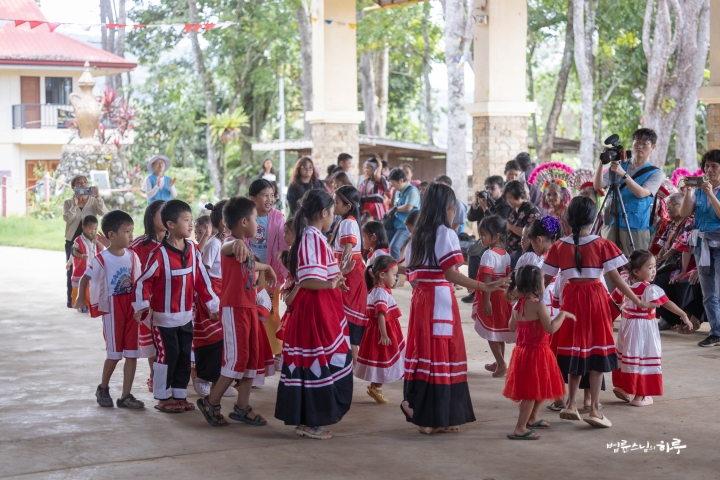
They showcased various dances of the Talaandig tribe one by one. Everyone applauded loudly as they watched the grandmothers’ dance reminiscent of flying birds, the children’s frog dance imitating frogs hopping, the monkey dance mimicking monkeys, and various other dances accompanied by percussion instruments making diverse sounds.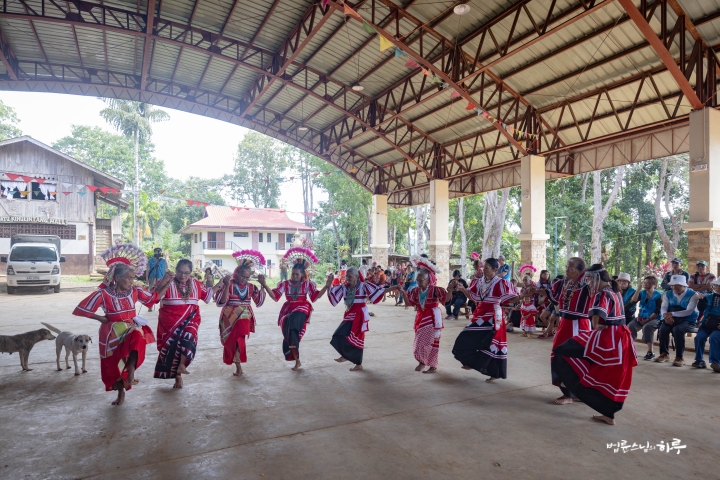
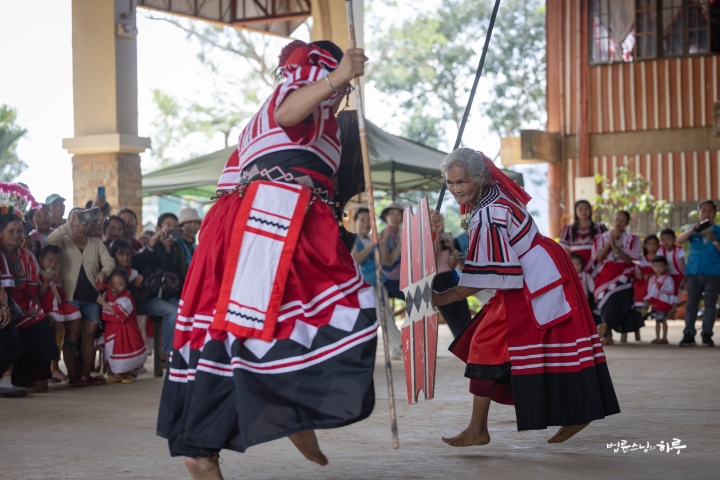
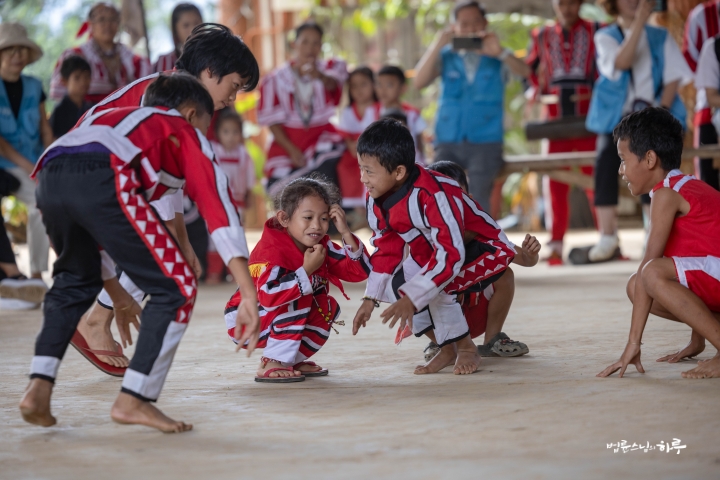
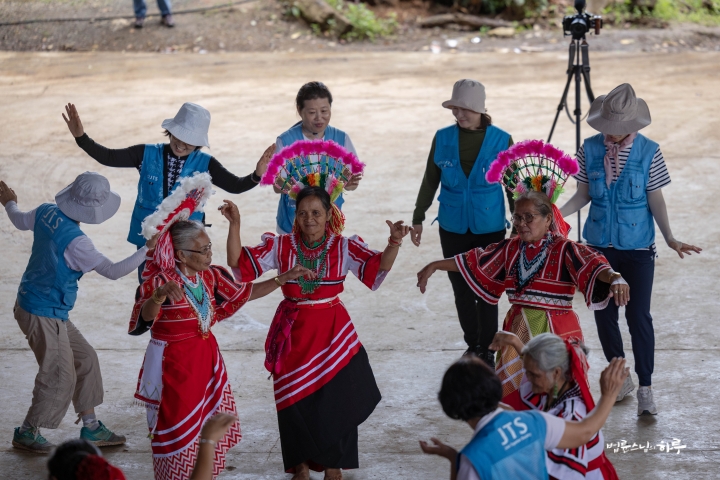
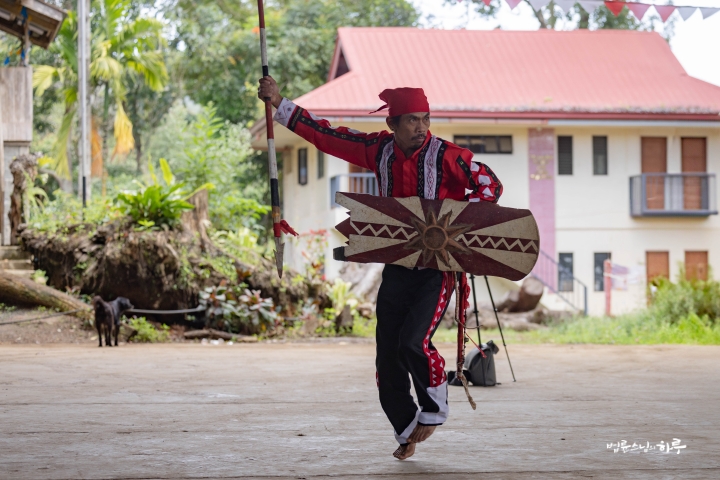
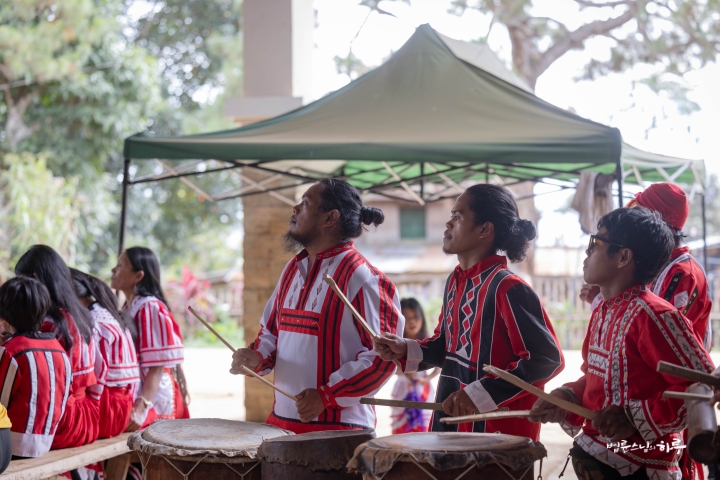
As the cultural performance reached its climax, even the Korean guests who had been just watching couldn’t resist the excitement and joined in, dancing shoulder to shoulder. The Talaandig tribe and the JTS delegation became one, dancing joyfully together.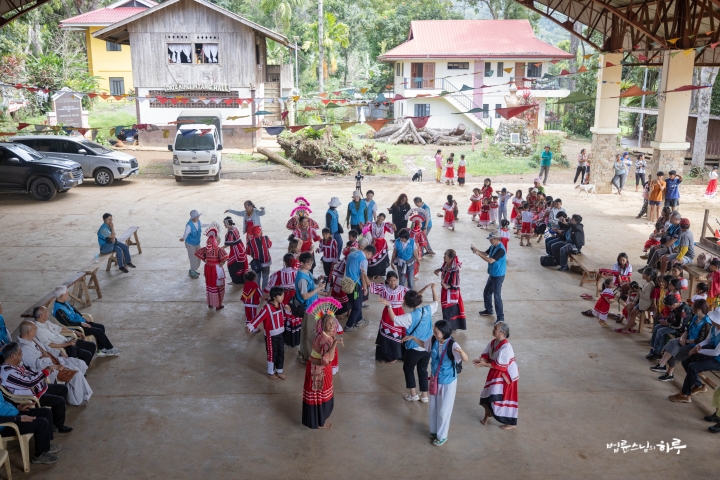
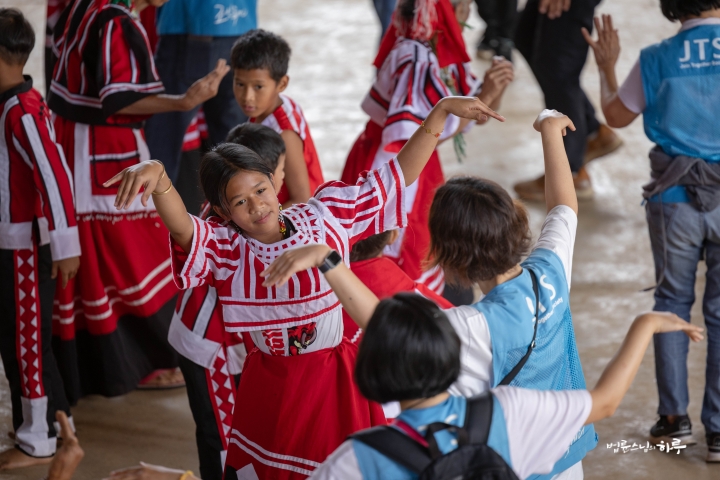
In most performances, there are dancers on stage and a majority watching, but in the Talaandig tribe’s performance, there is no separate audience. Anyone can come out and dance, and even young children come out to imitate, learning the dance over time. It’s not a performance for show, but a culture they enjoy themselves.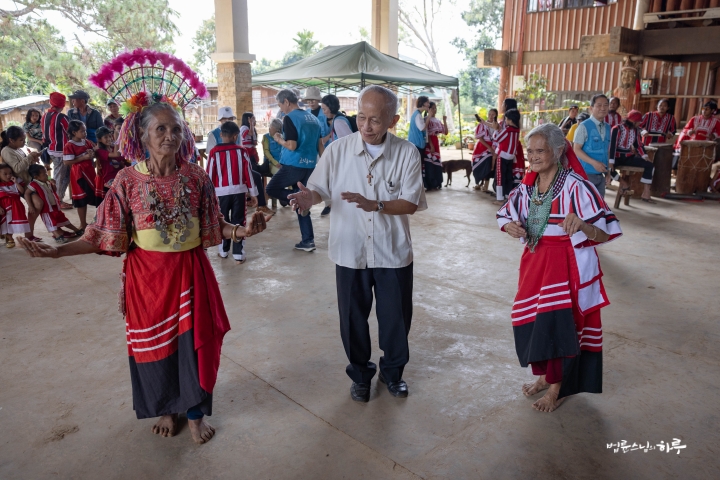

After finishing the joyful dance gathering, everyone went up to the second floor of the Peace Hall to eat lunch prepared by the Talaandig tribe. After the Datu finished the prayer, everyone started eating together.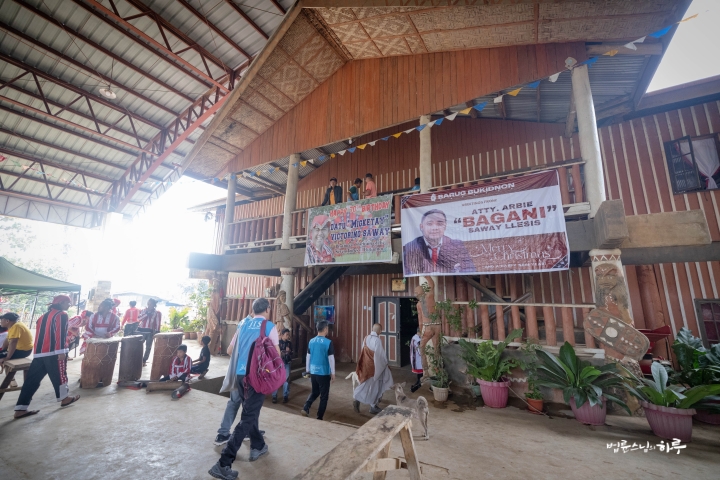
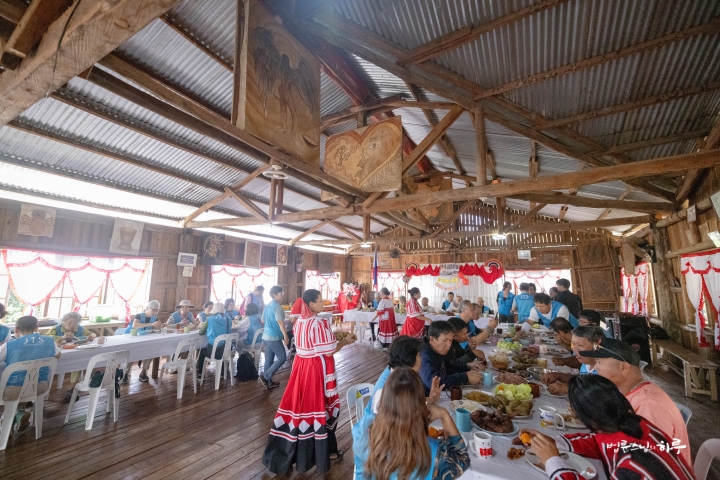
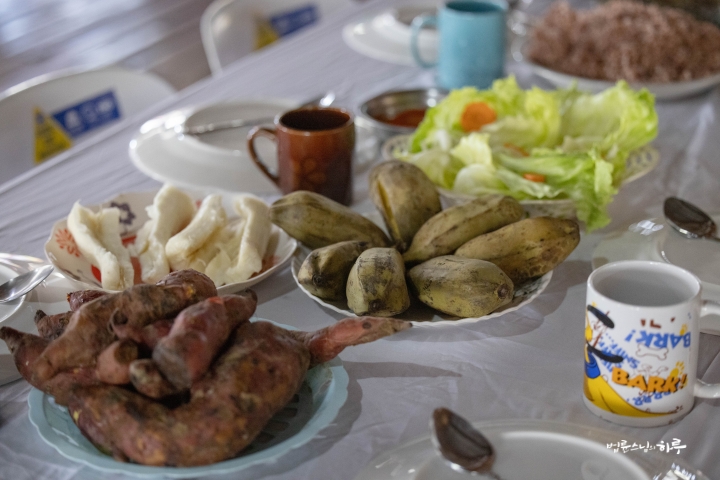
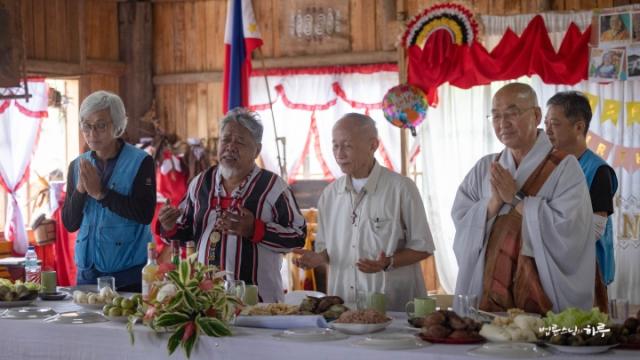
After finishing the meal, Sunim gave a thank-you speech. He asked Datu Migketay to be at the center of preserving traditional culture.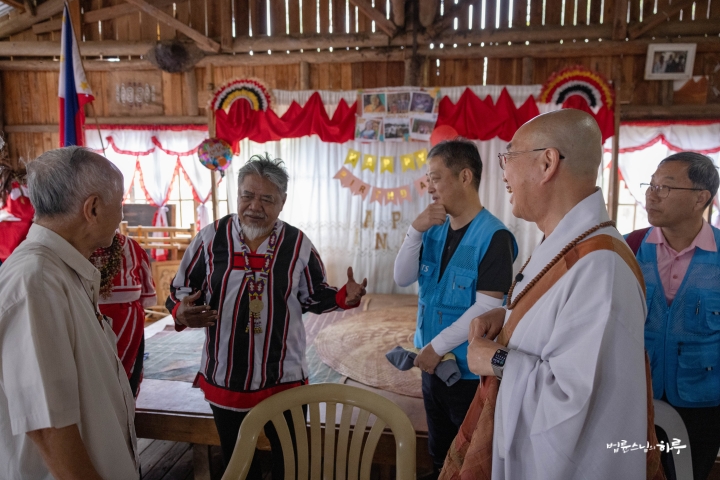
“Thank you for showing us a wonderful performance and preparing food for us. We came to hold the completion ceremony for 10 schools built by JTS. This year, we built 5 new schools for children with disabilities and 5 new schools for indigenous people.”
“Thank you for always visiting our village. The whole preparation process was happy for us.”
“When I visited the indigenous villages this time, I found that each village was preserving its traditional culture in its own way. So I asked them to preserve their traditional culture well. Please be at the center of helping not only the Talaandig tribe but also other tribes preserve their traditional culture.”
“I will do so. Tradition is a gift from God. Because tradition has been passed down to fit each tribe, I believe that preserving that tradition is our way of praising God.”
Sunim gave an offering to Datu Migketay and his wife to use for preserving traditional culture, exchanged farewell greetings, and left Songco village.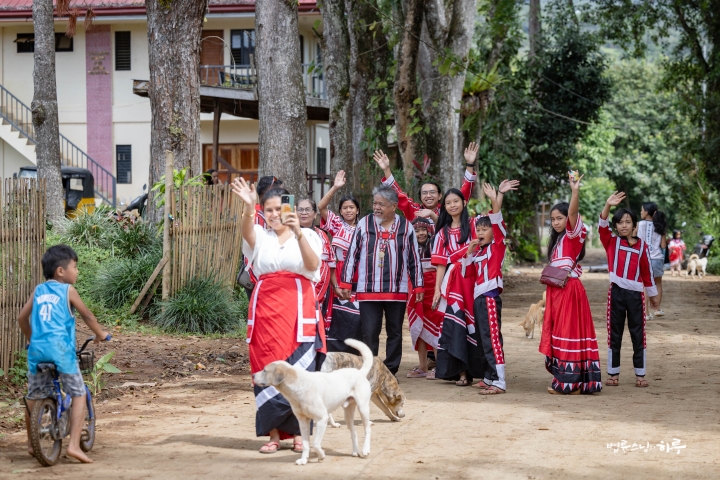
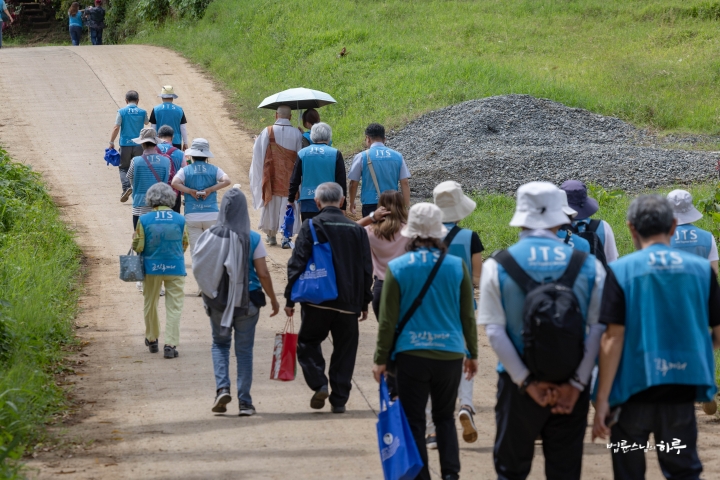
They departed from Songco village at 11 AM and headed to the JTS Center. On the way to the JTS Center, there is San Miguel High School in Talakag, which JTS held a completion ceremony for last year. They decided to stop by briefly to see if the school was operating well.
They arrived at San Miguel High School at 12 PM. After getting off the bus, they looked around every corner of the classrooms, starting with the restrooms. The traces left by students who had studied hard in the newly built school for a year after the completion ceremony were intact in every corner of the classrooms. Like baby birds preparing to flap their wings in a new nest, the students were nurturing their dreams in this space.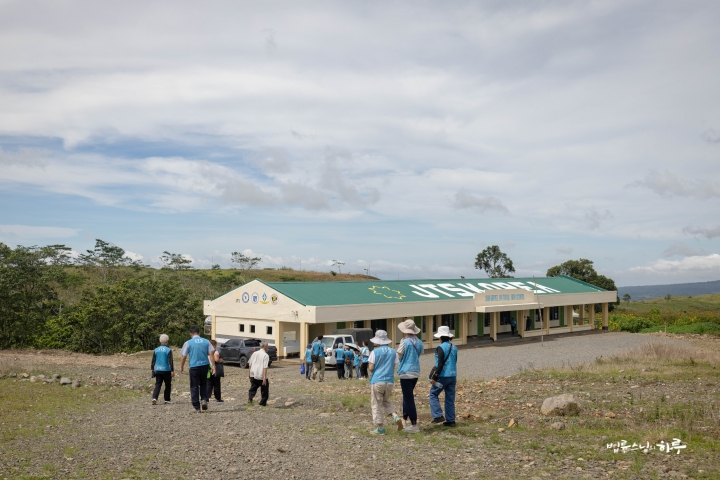
Many children couldn’t continue their education due to the lack of high schools nearby, many children were temporarily educated in makeshift buildings, and young people who couldn’t go to high school after graduating from elementary school were getting pregnant and marrying at a young age. At the earnest request of the superintendent of education, JTS decided to build a high school building.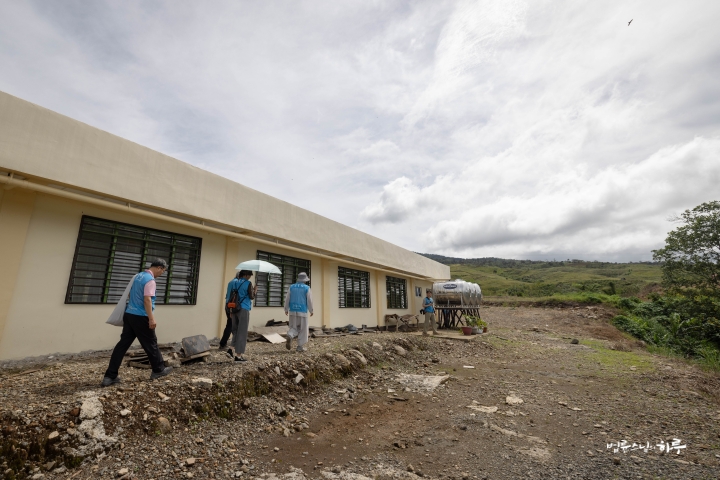
They took a commemorative photo with only the JTS delegation in front of the school.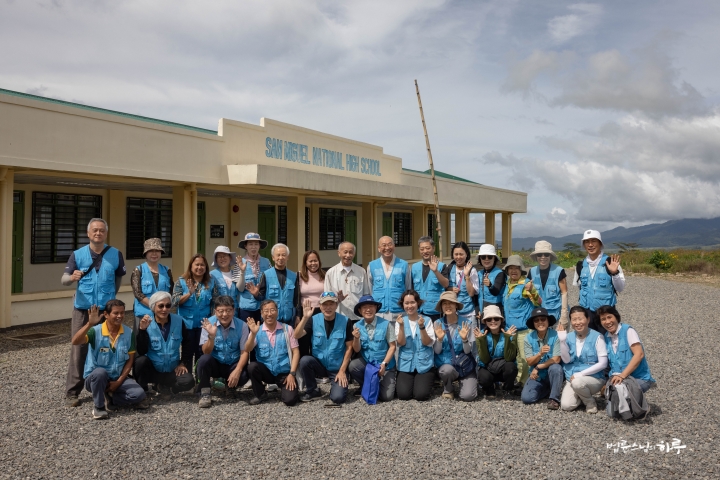
After looking around the school for 30 minutes, they got back on the bus.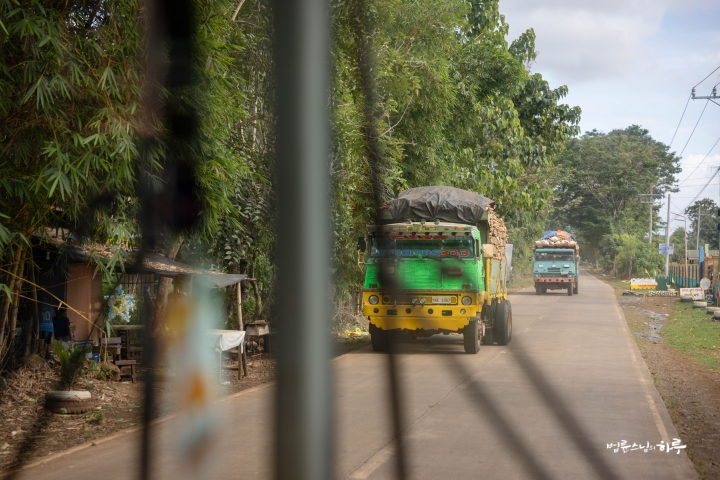
After traveling for 3 hours along winding mountain roads, they arrived at the Mindanao JTS Center at 3:30 PM.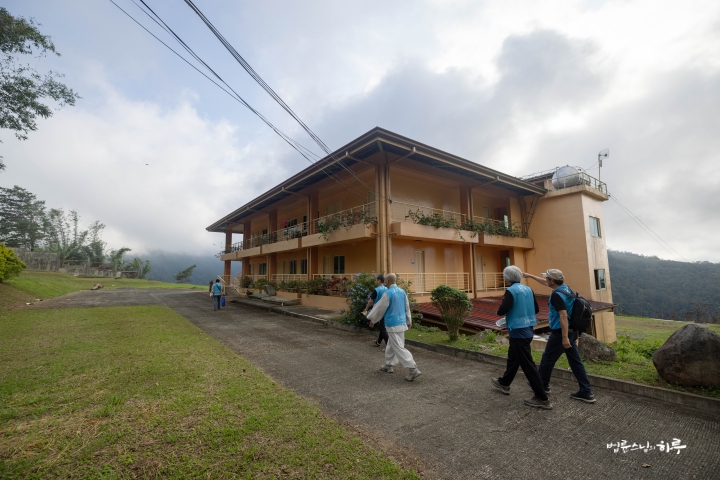
After just using the restroom, from 4 PM, they had a time to present this year’s business report and next year’s business plan for JTS Philippines and gather opinions in the auditorium of the JTS Center.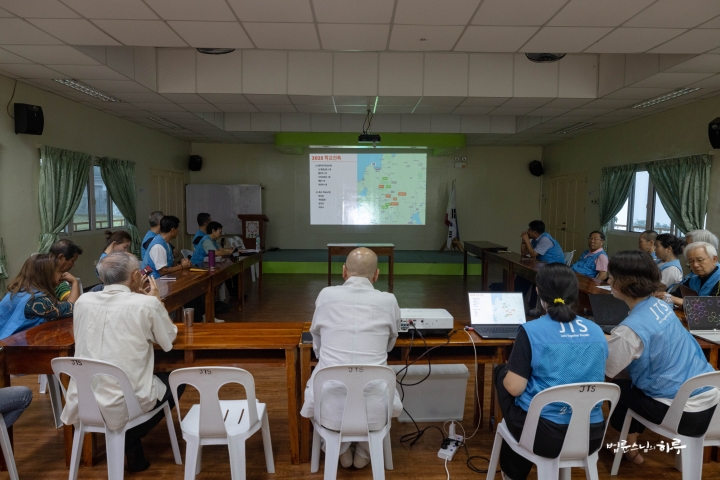
First, Dharma Teacher Hyanghun, who is in charge of the JTS Philippines office, presented this year’s business results and next year’s business plan.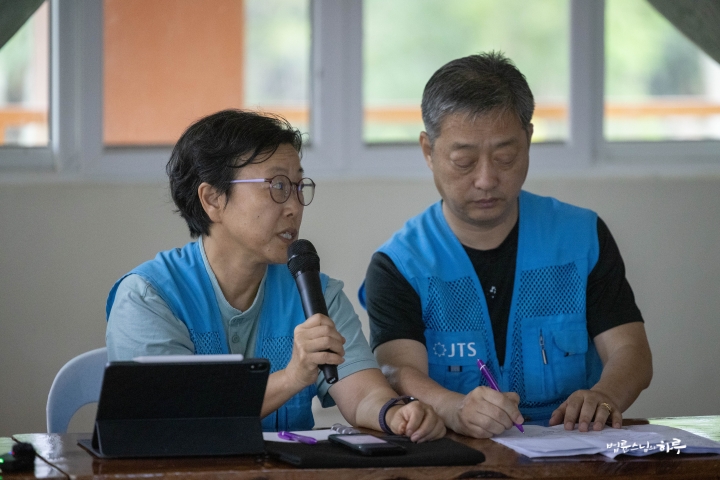
“Dr. Victoria V. Gazo, the Superintendent of Education in Bukidnon Province, who attended last year’s completion ceremony, emphasized that there are currently more than 3,000 classrooms lacking, and there are no independent classrooms for children with disabilities except for the schools built by JTS, and requested us to build more schools. Through repeated requests from the Education Office, we reconfirmed the still serious problem of classroom shortage and the urgent need for an environment for students with disabilities, and in 2024, we built a total of 10 schools: 5 schools for children with disabilities and 5 schools for indigenous people.
We have received many requests to build schools next year as well. Currently, we have planned to build a total of 11 schools: 6 schools for indigenous people and 5 schools for children with disabilities.”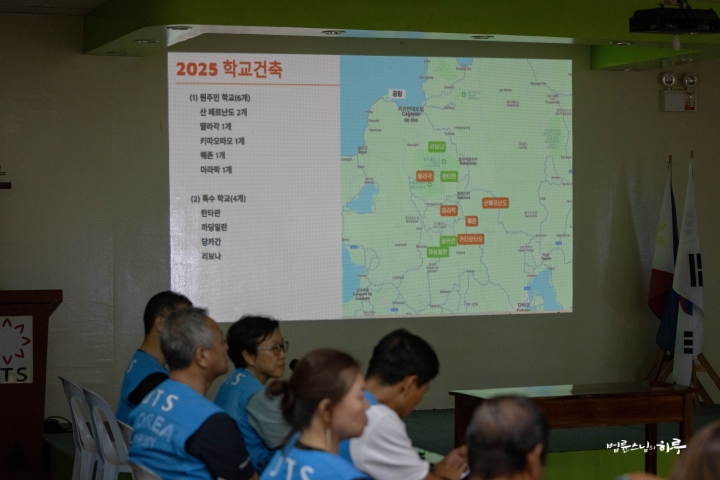
After the presentation, they had a Q&A session. Trel, who participates in JTS projects with great affection, made a suggestion.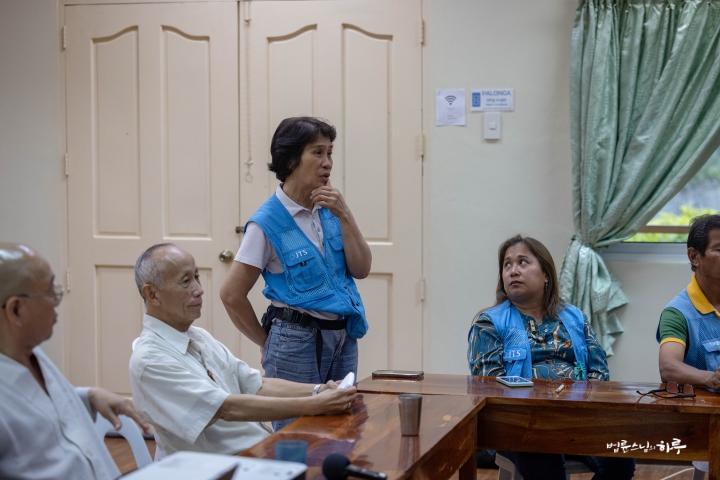
“There will be an election in the Philippines on May 12 next year. Since there are many restrictions during the election period, it would be good to investigate in advance and prepare countermeasures.”
Amidst the discussion, they agreed to investigate further and ensure that school construction would not be hindered. Also, there is a school built by JTS in Libona, where the JTS Center is located. They requested to build a new school because the current building, made of mud bricks, cannot be operated due to the risk of collapse. So the total number of schools to be newly built next year became 12.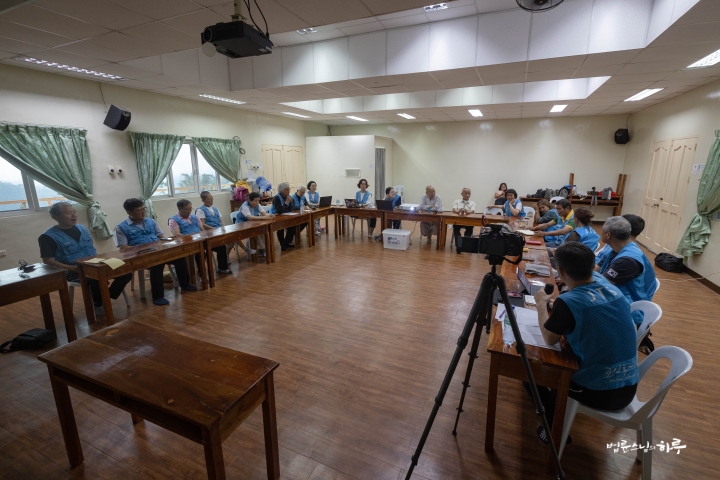
Lastly, as Christmas was approaching at the end of the year, Sunim asked Archbishop Tony for a sermon.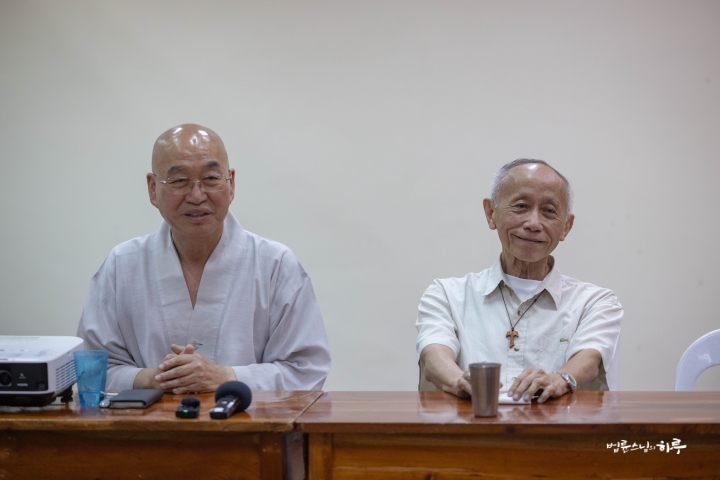
“As Christmas is approaching, I would like to ask Archbishop Tony to speak about what mindset we should have as people working in the Philippines. Most of the people here are based on Buddhism, but that doesn’t mean we are conducting business for religious purposes. Among those working here, there are also Catholic believers, and we are working beyond religion, so I ask the Archbishop to give good words to our activists.”
The Archbishop referred to the JTS activists as friends and emphasized how peace is being established in Mindanao through education, urging JTS to make more efforts.
“Dear JTS friends, I sincerely thank you for coming to Mindanao and the Bukidnon region to serve for more than 20 years. I was very moved after hearing the business report earlier. JTS has already built more than 200 classrooms. If I had known this earlier, I might have run for governor. (Everyone laughs)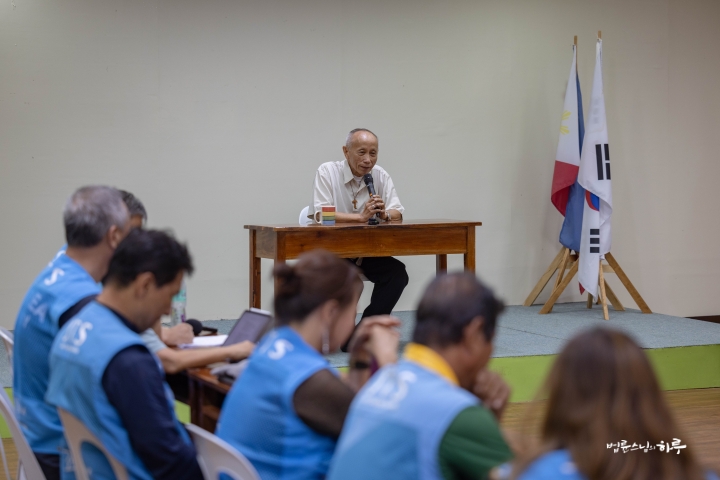
Additionally, I appreciate JTS’s efforts to collaborate with the Department of Education and local governments. Community development will have a big impact on the development of the growing younger generation. So I am deeply grateful for working closely with local governments in particular.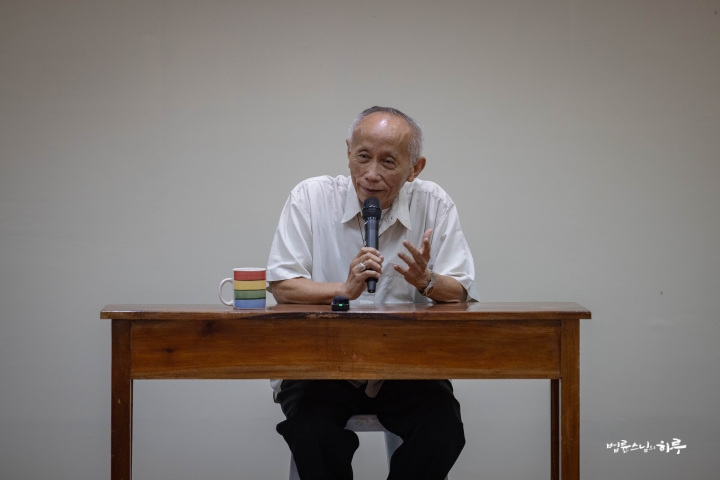
The current increase in the number of schools and students is both a blessing and a challenge. When visiting other countries, many countries are facing the problem of closing classrooms due to the lack of young people, but the situation is quite the opposite in the Philippines. The Philippines faces the challenge of coping with the growing number of children and supporting them to receive sufficient education necessary for their growth.
I was also very moved by JTS’s efforts to preserve traditional culture, especially among the projects they are carrying out with the Department of Education. Preserving local traditional culture is very important. Especially since the Bukidnon region can be considered the center of the seven tribes spread throughout Mindanao, maintaining the traditional culture of Bukidnon is very important.
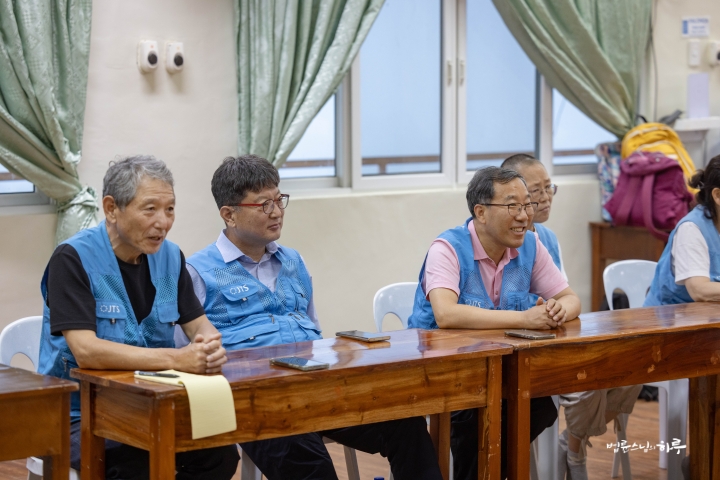
Why JTS School Construction Brings Peace to Mindanao
Over the past few years, relations with the Muslim community in Mindanao have greatly improved with the establishment of the Muslim autonomous government. Now, efforts are being made to achieve peace with the New People’s Army (NPA) as well. Just as relations with Muslims have improved, it is hoped that relations with the NPA will also develop positively. In particular, many mountain tribes are affiliated with the NPA, and providing education to the mountain tribes of Bukidnon is believed to contribute significantly to finding peaceful solutions. It is hoped that these peaceful relationships will further improve through education.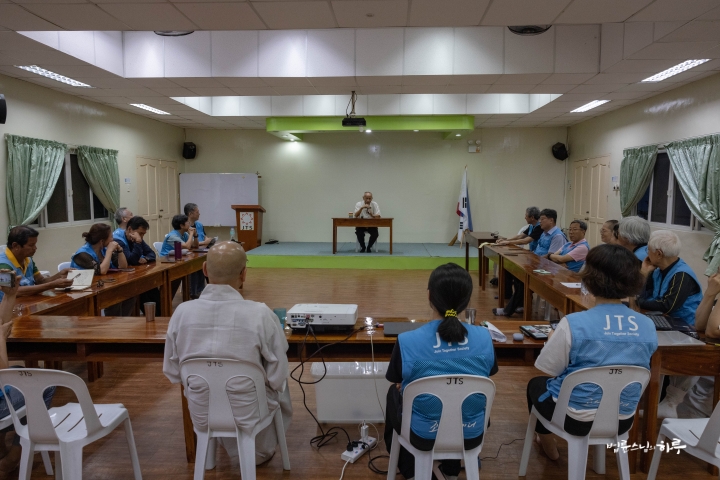
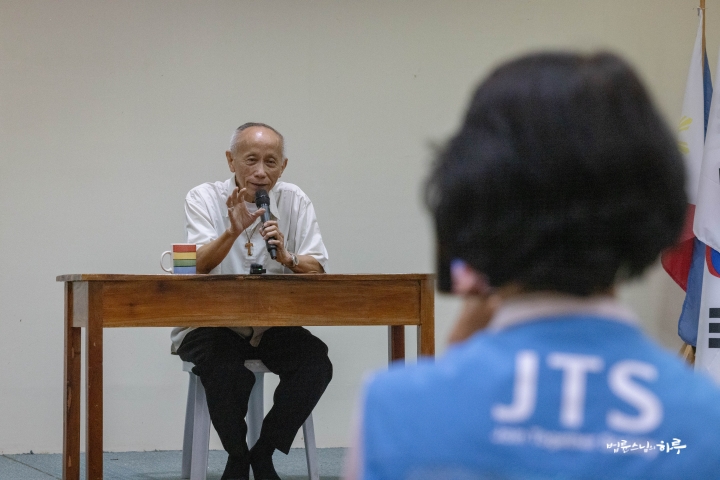
Your activities will serve as an important example of what can be achieved through education. I believe it will become a model showing that indigenous communities can also develop together, especially through the education of the next generation.”
Everyone gave a round of applause to Archbishop Tony, who always shows affection for JTS activities.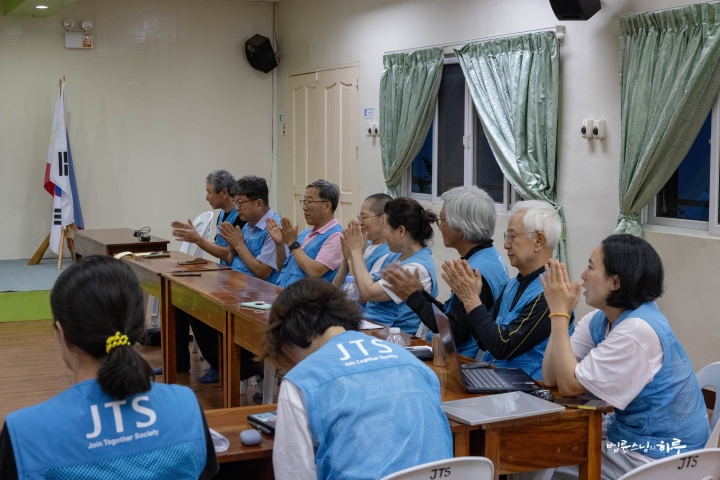
After dinner, we went out to the front yard of the JTS center for the ‘Night in Mindanao’ event. Tonight is the last night in Mindanao.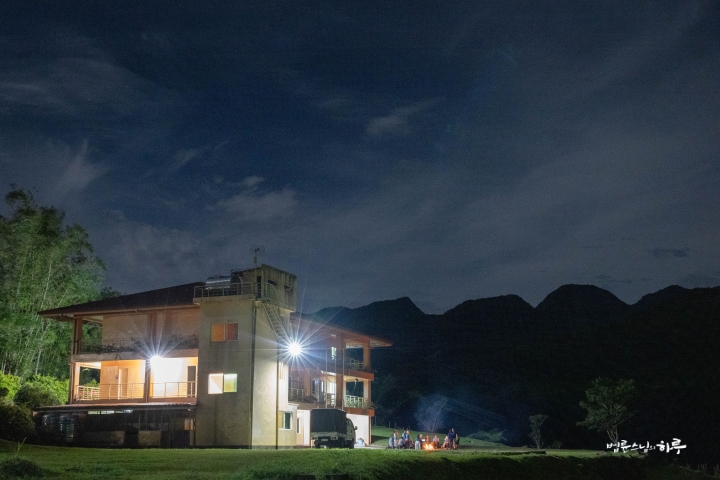
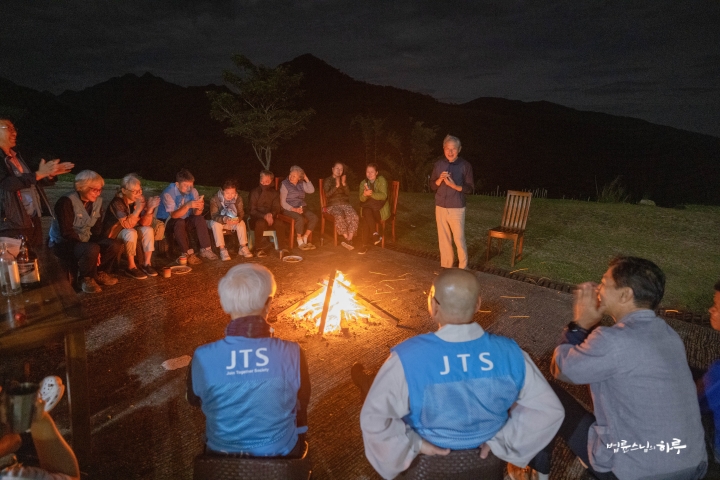
JTS volunteers lit a bonfire with firewood and sat in a circle. We took turns sharing our thoughts and feelings from the past five nights and six days. We shared feelings of celebration and gratitude, and each person sang a song.
At 10 PM, we concluded the Night in Mindanao event, praying that the sweat and efforts of JTS volunteers would become a light bringing peace to Mindanao.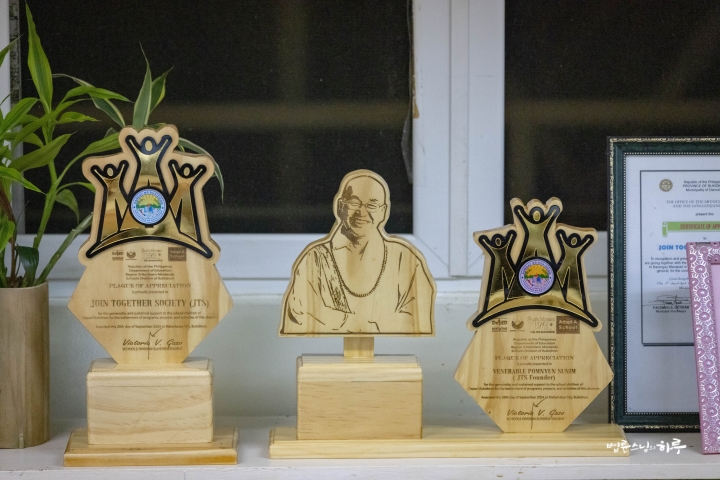
As there was no Dharma talk today, I will conclude by introducing the content of the Happy Dialogue Q&A lecture held in Goyang City on the 6th.
How Can I Communicate with My Son Who Has Become Less Talkative Since Adolescence?
‘Son, I want to talk with you a lot. Talk more. You shouldn’t be close to any other woman except me. You should be closest to me.’
This kind of thinking is wrong. Although you gave birth to and raised your son, you should see him as an independent person. Your son thinks differently from you. Your son can’t be what you want him to be. Your parents can’t think the same as you, your husband who sleeps in the same bed can’t be the same as you, and even the child you gave birth to and raised is different from you. You must first acknowledge that parents are different from you, your husband is different from you, your children are different from you, your friends are different from you, and your neighbors are different from you.
‘I want to talk a lot with my son, but my son is not talkative’
‘I want to go out with my husband, but my husband wants to rest at home’
You should first be able to acknowledge that others are different from you. When we acknowledge our differences as they are, without viewing them negatively, we call this ‘respect.’ Our society considers respect a universal value. If we think ‘it’s wrong because it’s different from me’ without respect for others, we end up demonizing them. America’s designation of North Korea as a rogue state or axis of evil is an example of such demonization. After demonization, we start to think ‘It’s okay to kill demons.’ That’s why wars happen. We start to think it’s natural for the other country to be ruined, and we view the deaths of the other country’s citizens as natural.
First, you need ‘respect’ for your son. Respect is not about putting the other person on a pedestal, but about accepting them as they are, different from you. Second, going a step further, it’s about understanding the other person by thinking, ‘From their position, they might think that way.’ ‘From their position, they might say that,’ ‘From their position, they might act that way’ – this is what we call ‘understanding.’ Understanding doesn’t mean the other person is right, but that you can see why they might think or act that way. ‘From a parent’s position, they might think that way,’ ‘From a husband’s position, they might do that,’ ‘From a child’s position, they might act that way,’ ‘From a friend’s position, they might say that,’ ‘From Japan’s position, they might think that way’ – this is how you should view things. Understanding is love. Love without understanding is violence. The most representative form of such violence is sexual violence. Forcibly hugging and kissing someone regardless of whether they like it or not is called sexual violence or sexual harassment.
It can also be said that you are displaying a violent attitude toward your son. You’re unilaterally forcing him to do what you want. You think it’s love, which is why when parents hit their children or teachers hit their students, they rationalize it by saying, ‘This is a loving punishment. This is all for your own good.’ This is wrong thinking.
If your son is not talkative, you should just accept it as ‘My child doesn’t talk much.’ If your son doesn’t come out of his room, avoids conversations with people, and stays alone at school, he might have a mental illness. If he’s only quiet with you, that’s fine. If he’s like that with everyone, you should go to the hospital for a check-up and consult with a doctor. If it’s a mental illness, he can receive treatment, and if there’s nothing wrong, you can just wait. From your position, you might want to have sweet conversations with your son, but your son is in the process of becoming an adult and doesn’t like being treated like a child by his parents. Your son might think, ‘Outside, people treat me like an adult, but mom treats me like a child.’ That’s why he starts to dislike being with his mother.
First, it would be good to examine whether the reason your son is distancing himself from you is due to some mental illness, or because you’re not recognizing your child, who is over twenty, as an adult. As you examine this, try asking your son some light questions. Especially during puberty, boys really dislike it when their mothers make too much physical contact. If the mother keeps touching them saying they’re pretty, it should be seen as harassment.
It’s natural for a child to like someone of the opposite sex more than their mother as they grow up. That’s why I said at the beginning that you seem a bit lacking. You’re even worried about ‘What if my son likes another woman more than me?’ Of course, there are examples like the current French president where a young man likes an older woman. He fell in love and married his friend’s mother who was 25 years older than him. But most people tend to like someone of their own age. From your perspective, you might like your son, but from your son’s perspective, you’re an old woman. Why would a young man like an old woman? So your son’s attitude is not because he dislikes you, but it’s a natural behavior. If he liked his mother more, that would be a bigger problem in the future. If a woman marries a mama’s boy, her married life becomes very difficult. This is because he consults his mother and makes decisions about even small matters.
You’re currently trying to make your son a mama’s boy. Or you’re trying to make him your boyfriend. This will lead to bigger problems later. There’s a problem with your way of thinking. Both are very dangerous thoughts. It would be good to look at it from this perspective. If you want to play with a man, don’t look for a young man, play with your husband. Don’t you like your husband?”
“No, Sunim.”
“Then do you want to play with both of them?”
“I keep getting greedy.”
“You need to change your perspective. Doing that doesn’t help your children grow.”
“Yes, thank you.”
Tomorrow, we will depart from the JTS center at 3 AM and move to Cagayan de Oro Airport. After arriving in Manila by plane, in the morning, Sunim will hold a special Dharma talk for Manila Jungto Society members. In the afternoon, he will visit the Ramon Magsaysay Award Foundation to meet with officials, and then give a Dharma Q&A lecture for Korean expatriates at the Asian Institute of Management located in downtown Manila.




